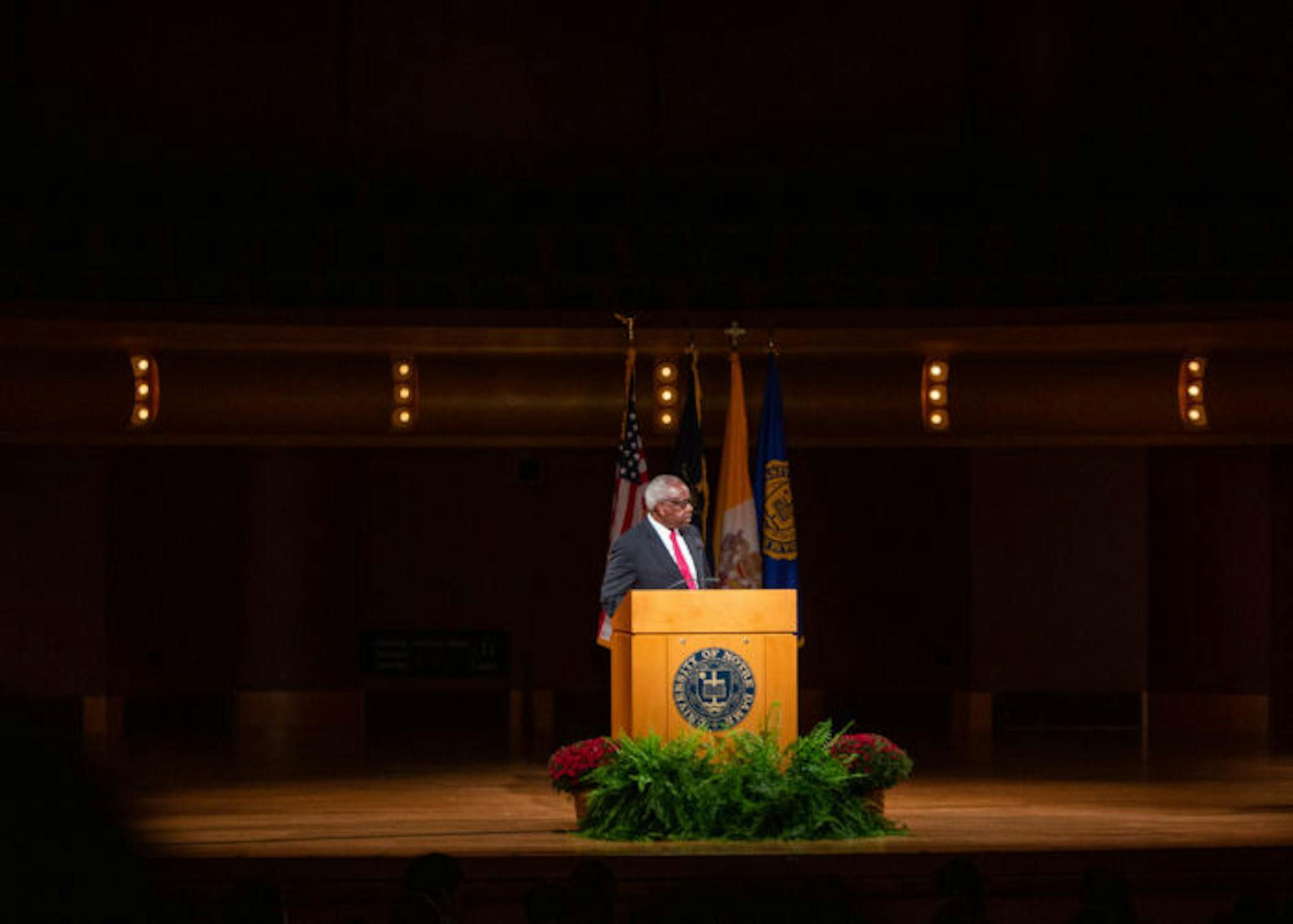Supreme Court Justice Clarence Thomas spoke at the Debartolo Performing Arts Center Thursday for the 2021 Tocqueville Lecture Series. Currently, Thomas is the Senior Associate Justice of the Supreme Court.
Thomas spoke about growing up in Georgia, his interpretation of race theory and gave advice to students interested in law. He described his childhood in Georgia in the 1950s and 60s as a very different world and suggested that time created the “race-obsessed” world of the current day.
“The world where I grew up was quite different from the world of the day; that is obvious,” Thomas said.
Thomas is the second Black justice to sit on the supreme court. Born in the Pinpoint area — close to Savannah, Georgia — on June 23, 1948, he studied at Conception Seminary College from 1967-1968 and then graduated with a bachelor’s degree from the College of the Holy Cross in 1971 with cum laude distinction. He later started at Yale Law School in 1974.
He began practicing law in Missouri in 1974 and eventually became the assistant attorney general, an attorney with the Monsanto Company and the legislative assistant for Sen. John Danforth. Thomas moved up in ranking from working in the Capitol, state department and the appeals court of the District of Columbia until he was formally nominated onto the Supreme Court in 1991.
During his talk, Thomas shared his experience of being the only Black student in seminary and higher education. He also spoke on race and its implications in American society. Thomas noted the partisan divide in America, and the struggle to compromise in government and society.
Speaking on the Declaration of Independence, Thomas addressed “one glaring contradiction” on the legality of slavery. Thomas said he believes the country’s leaders were so ashamed of owning slaves they chose not to use the word slave in the declaration. In the Declaration, he said the equality of all men has always been present.
“The Declaration of Independence remains our national North Star,” Thomas said.
He continued to speak on what he said is a pessimism he sees in the U.S. today — including citizens who “cancel [the country’s] founders” — yet he said he believes there is a large majority who still hold faith in the original values of America and the progress of the nation.
“There are many more of us that, I think, feel that America is not so broken, as it is adrift at sea,” he said.
While Thomas was speaking, two audience members protested by standing up in the auditorium with signs that said, “I stand with Anita Hill.”
Hill was a former employee of Thomas who accused him of sexual harassment during his 1991 confirmation hearing.
The protestors were removed from the room shortly after standing up with their signs for half of the lecture. After the protestors were escorted out, Thomas took audience questions during a moderated Q&A.
One student asked if there were times Thomas has had conflicting interests between his Catholic faith and the legal cases he was required to resolve, which Thomas said was difficult to navigate.
“There are some things that conflicted very strongly with my personal opinion, my policy preference, and that was very, very hard, particularly early on,” he said. “I don’t think a single person will ever tell you that [the Supreme Court does] anything other than our job.”
Another student asked whether Thomas believed more “regular” Americans should read court opinions. Thomas explained the primary audience is his “fellow citizens,” and clerks work to make the opinions more readable. He recalled one instance that touched him when a man ran up to him and asked him to sign one of Thomas’ court opinions.
“He said, ‘I want you to sign this and I want to thank you for making it understandable by a regular citizen.’ And I said, ‘Wow, thank you,’ you know, I mean it really made me feel good,” Thomas said.
Throughout the lecture, Thomas emphasized the importance of always seeing the best of people and being careful with assumptions.
“We just seem like we keep dividing stuff into subcategories of differences and emphasizing those differences. So, I think you look for the good in the people around you, even if others around you don’t do things properly, you still try to do it,” Thomas said.
To close off the lecture, Thomas shared words of wisdom for any student interested in the legal world.
“Do not lose sight of what’s good and good people,” Thomas said. “We’ve gotten to a point in society where we’re really good at finding something that separates us from others.”













